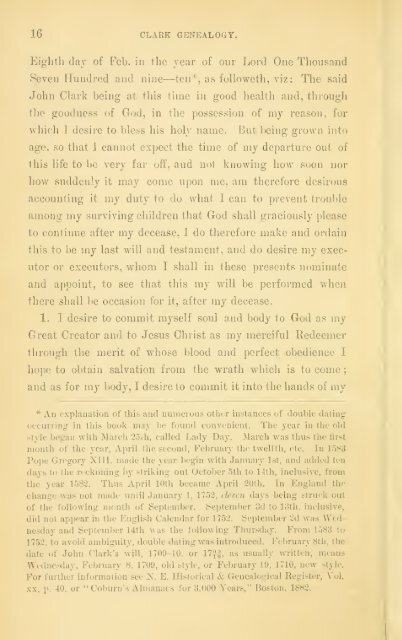A record of the descendants of John Clark, of Farmington, Conn ...
A record of the descendants of John Clark, of Farmington, Conn ...
A record of the descendants of John Clark, of Farmington, Conn ...
You also want an ePaper? Increase the reach of your titles
YUMPU automatically turns print PDFs into web optimized ePapers that Google loves.
16 CLARK GENEALOGY.<br />
Eiglitli day <strong>of</strong> Feb. in <strong>the</strong> year<br />
<strong>of</strong> our Lord One Thousand<br />
Seven Hundred and nine— ten*, as foliowe th, viz: The said<br />
<strong>John</strong> <strong>Clark</strong> being at this time in good health and, througli<br />
<strong>the</strong> goodness <strong>of</strong> God, in <strong>the</strong> possession <strong>of</strong> my reason, for<br />
which I desire to bless his holy name. But being grown into<br />
age, so that I cannot expect <strong>the</strong> time <strong>of</strong> my departure out <strong>of</strong><br />
this life to be very far <strong>of</strong>f, and not knowing how soon nor<br />
how suddenly it may come upon me, am <strong>the</strong>refore desirous<br />
accounting it my duty to do what 1 can to prevent trouble<br />
among my surviving children that God shall graciously please<br />
to continue after my decease, I do <strong>the</strong>refore make and ordain<br />
this to be my last will and testament, and do desire my exec-<br />
utor or executors, whom I shall in <strong>the</strong>se presents nominate<br />
and appoint, to see that this my will be performed when<br />
<strong>the</strong>re shall be occasion for it, after iny decease.<br />
1. I desire to commit myself soul and body to God as ray<br />
Great Creator and to Jesus Christ as my merciful Redeemer<br />
through <strong>the</strong> merit <strong>of</strong> whose blood and perfect<br />
obedience I<br />
hope to obtain salvation from <strong>the</strong> wrath which is to come ;<br />
and as for my body, I desire to commit it into <strong>the</strong> hands <strong>of</strong> my<br />
* An explanation <strong>of</strong> this and numerous o<strong>the</strong>r instances <strong>of</strong> double dating<br />
occurring in this book may be found convenient. The 3'ear in <strong>the</strong> old<br />
style began with March 25ih, called Lady Day. March was thus <strong>the</strong> first<br />
month <strong>of</strong> <strong>the</strong> year, April <strong>the</strong> second, February <strong>the</strong> twelfth, etc. In 1583<br />
Pope Gregory XIII. made <strong>the</strong> year begin with January 1st, and added ten<br />
days to <strong>the</strong> reckoning by striking out October 5th to 14lh, inclusive, from<br />
<strong>the</strong> year 1583. Thus April 10th became April 20th. In England <strong>the</strong><br />
change was not made until January 1, 1752, eleven days being struck out<br />
<strong>of</strong> <strong>the</strong> following month <strong>of</strong> September. September 3d to 13th, inclusive,<br />
did not appear in <strong>the</strong> English Calendar for 1752. September 2d was Wednesday<br />
and September 14th was <strong>the</strong> following Thursday. From 1583 to<br />
1752, to avoid ambiguity, double dating was introduced. February 8th, <strong>the</strong><br />
date <strong>of</strong> <strong>John</strong> <strong>Clark</strong>'s will, 1709-10, or 17fg, as usually written, means<br />
Wednesday, February 8, 1709, old style, or February 19, 1710, new style.<br />
For fur<strong>the</strong>r information see N. E. Historical & Genealogical Register, Vol.<br />
XX, p. 40, or " Coburn's Almanacs for 3,000 Years," Boston, 1882.

















